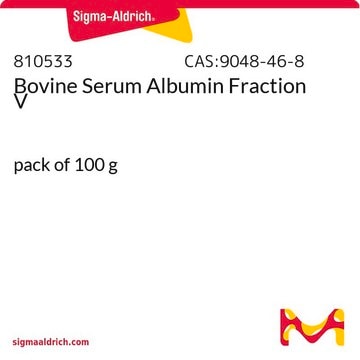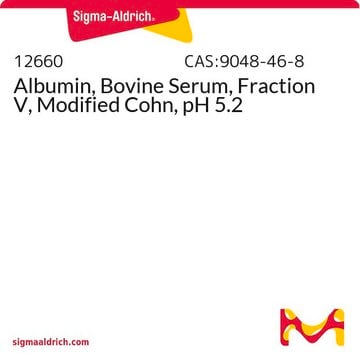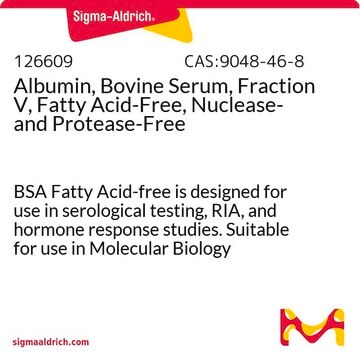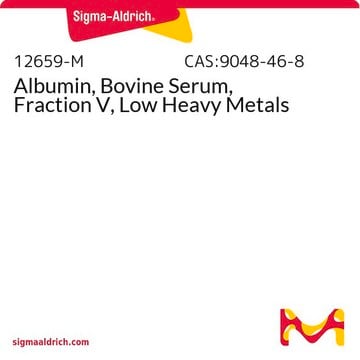1.12018
Albumin fraction V
(from bovine serum) for biochemistry
Synonym(s):
Albumin fraction V, Bovine serum albumin, Serum albumin
Sign Into View Organizational & Contract Pricing
All Photos(1)
About This Item
Recommended Products
form
solid
pH
6.8-7.2 (20 °C, 1 g/L in H2O)
solubility
1 g/L
bulk density
150 kg/m3
storage temp.
2-8°C
General description
Bovine serum albumin (BSA) belongs to the serum albumin family with three domains and two sub-domains each. This globular, α-helical, non-glycosylated protein has 17-disulfide bonds.
Application
Albumin fraction V has been used:
- as a component of perfusion buffer for perfusion protocol for rodent organ perfusion
- as a blocking agent in western blot analysis
- as a nitrated protein standard to study the effects of antibodies against 3-nitrotyrosine and to characterize the binding and detection of nitrated proteins in one-sided and sandwich immunoassays
Biochem/physiol Actions
Bovine Serum Albumin (BSA) is the chief component of cell culture media and also works as a blocking agent in enzyme-linked immunosorbent assay (ELISA). It is beneficial for embryonic stem cells (hESC) differentiation and assists the transport of drugs, hormones, and fatty acids.
Analysis Note
Appearance (colour): slightly yellow
Appearance (description): leafs
Assay of protein (spectralphotometric; calc. on anhydrous substance): ≥ 97.0 %
Assay of Albumin (Agarose gel electrophoresis): ≥ 98.0 %
pH-value (1 %; sodium chloride solution c = 0.5 mol/ l): 6.8 - 7.2
K (Potassium): ≤ 0.02 %
Na (Sodium): ≤ 0.5 %
Mg (Magnesium): ≤ 0.01 %
Ca (Calcium): ≤ 0.05 %
Heavy metals (as lead): ≤ 0.001 %
Fats: ≤ 0.2 %
Decomposition products: not detectable
Water (according to Karl Fischer): ≤ 5.00 %
Ash (600 °C): ≤ 1 %
NADH Oxidase (NADH; pH 7.5; 25° C): not detectable
LDH (pyruvate; pH 7.5; 25° C): not detectable
Appearance (description): leafs
Assay of protein (spectralphotometric; calc. on anhydrous substance): ≥ 97.0 %
Assay of Albumin (Agarose gel electrophoresis): ≥ 98.0 %
pH-value (1 %; sodium chloride solution c = 0.5 mol/ l): 6.8 - 7.2
K (Potassium): ≤ 0.02 %
Na (Sodium): ≤ 0.5 %
Mg (Magnesium): ≤ 0.01 %
Ca (Calcium): ≤ 0.05 %
Heavy metals (as lead): ≤ 0.001 %
Fats: ≤ 0.2 %
Decomposition products: not detectable
Water (according to Karl Fischer): ≤ 5.00 %
Ash (600 °C): ≤ 1 %
NADH Oxidase (NADH; pH 7.5; 25° C): not detectable
LDH (pyruvate; pH 7.5; 25° C): not detectable
Storage Class Code
11 - Combustible Solids
WGK
WGK 3
Flash Point(F)
Not applicable
Flash Point(C)
Not applicable
Certificates of Analysis (COA)
Search for Certificates of Analysis (COA) by entering the products Lot/Batch Number. Lot and Batch Numbers can be found on a product’s label following the words ‘Lot’ or ‘Batch’.
Already Own This Product?
Find documentation for the products that you have recently purchased in the Document Library.
Customers Also Viewed
Sebastian Ivens et al.
Brain : a journal of neurology, 130(Pt 2), 535-547 (2006-11-24)
It has long been recognized that insults to the cerebral cortex, such as trauma, ischaemia or infections, may result in the development of epilepsy, one of the most common neurological disorders. Human and animal studies have suggested that perturbations in
J L Lanciego et al.
Brain research. Brain research protocols, 2(4), 323-332 (1998-06-19)
The present report deals with a multiple tract-tracing procedure in non-human primates enabling the simultaneous visualization of retrogradely transported Fluoro-Gold (FG) and cholera toxin B subunit (CTB) in combination with anterogradely transported biotinylated dextran amine (BDA). Two issues have played
Thomas Franze et al.
The Analyst, 129(7), 589-596 (2004-06-24)
Three monoclonal antibodies (mAb) and three polyclonal antibodies (pAb) have been characterized and compared with respect to their cross-reactivities and affinities for 3-nitrotyrosine, eight aromatic compounds with similar chemical structures, a peptide containing a single nitrotyrosine residue, and fourteen nitrated
Holger Jungbluth et al.
Clinical oral investigations, 18(9), 2077-2086 (2014-02-08)
The aim of this series of studies was the development and validation of a new model for evaluation of dentinal hypersensitivity (DH) therapies. Roots from extracted human teeth were sealed with a flowable composite. In the cervical area, a 3-mm-wide
Charlotte Bayer Christiansen et al.
American journal of physiology. Gastrointestinal and liver physiology, 315(1), G53-G65 (2018-03-02)
The colonic epithelium harbors a large number of endocrine cells, but little is known about the endocrine functions of the colon. However, the high density of glucagon like peptide-1 (GLP-1)- and peptide-YY (PYY)-secreting L cells is of great interest because
Our team of scientists has experience in all areas of research including Life Science, Material Science, Chemical Synthesis, Chromatography, Analytical and many others.
Contact Technical Service













